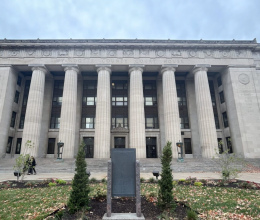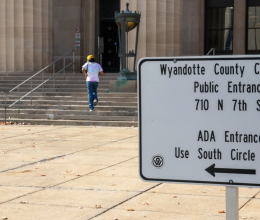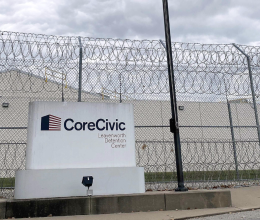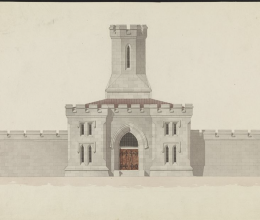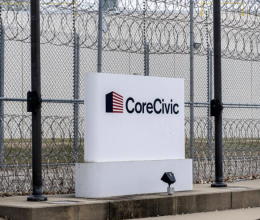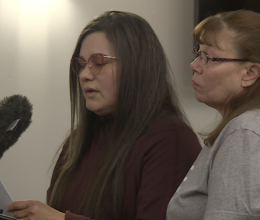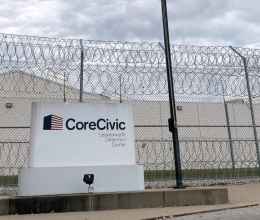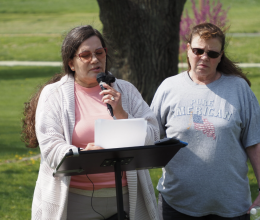
Opponent Testimony for HB 2538 – Preliminary hearing time requirement; two-way audio-visual; hearsay evidence
Aileen Berquist, Community Engagement Manager,
American Civil Liberties Union of Kansas
House Judiciary Committee
Thursday, February 3 at 3:30 PM - 582-N
Committee Chairs and Members of the Committee,
Thank you for the opportunity to present testimony today. My name is Aileen Berquist. I am the Community Engagement Manager and lobbyist for the ACLU of Kansas. We are a nonpartisan, non-profit organization that works to preserve and strengthen the civil rights and liberties of every person in our state.
The ACLU of Kansas is opposed to HB 2538 for three crucial reasons: the use of two-way electronic communications in this context is a violation of the Sixth Amendment’s Confrontation Clause; “reasonable time” is a vague, immeasurable standard, which will inevitably result in delayed proceedings; and evidence that would be inadmissible at trial should not be used by the prosecution to meet its burden of proof at a preliminary hearing.
The Sixth Amendment of the Constitution guarantees that "in all criminal prosecutions, the accused shall enjoy the right…to be confronted with the witnesses against him."
The Confrontation Clause is a hallmark of our criminal legal system. It helps guard against the possibility of perjury and permits the defense to engage in rigorous cross-examination—what the Michigan Supreme Court has called “the greatest legal engine ever invented for the discovery of truth.” Finally, the Confrontation Clause allows the finder of fact—whether it be the judge or the jury—to “observe the demeanor of the witness in making his statement, thus aiding … in assessing his credibility.”1
The presentation of witness testimony through two-way electronic communication violates the Confrontation Clause and the principles that animate it. State Supreme Courts have considered measures similar to the one before the committee today, and held that such measures are unconstitutional, overturning convictions as a result. In 2020, the Michigan Supreme Court found in People v Jemison2 that the use of two-way audio-visual testimony by a witness violated the Confrontation Clause. And, just last month, the Missouri Supreme Court reversed a conviction on the grounds that the permission of witness testimony via live video violated the Confrontation Clause.3 For these reasons, we ask that this provision be struck from the bill.
An additional concern is the use of the phrase “reasonable time” regarding when a preliminary hearing can be set after arrest. “Reasonable time” is an amorphous standard that will undoubtedly lead to delayed hearings. It is extraordinarily vague and subjective and opens the window that will only serve to further delay this important stage of a criminal case. It is particularly problematic because the Kansas legislature has already suspended defendants’ statutory right to a speedy trial.4 The legislature should not countenance legislation that provides for further delays in important stages of proceedings, as it will result in more individuals remaining incarcerated for long periods of time while they wait for their day, or days, in court.
And finally, hearsay evidence is inadmissible at trial and should be given no more credence at a preliminary hearing. The burden should be on the prosecution at the preliminary hearing to prove that there are grounds for prosecuting the defendant. Relying on hearsay is patently unfair to the defendant. It will result in more people being bound over for trial where the prosecution does not have sufficient evidence to prove their case. And, because many of those individuals will sit in jail pre-trial, changes such as this will create incentives for those people to forfeit their constitutional rights and accept a plea deal. A criminal legal system that is heavily reliant on lengthy delays and coercing plea deals is unfair, unduly punitive, and destroys confidence in the system as a whole.5
We sincerely hope that this Committee will not move forward with this bill. We have included additional resources here for your consideration. Thank you for the opportunity to present testimony today.
Additional Resources
State v Smith, https://law.justia.com/cases/missouri/supreme-court/2022/sc99086.html
People v Jemison, https://www.courts.michigan.gov/siteassets/casedocuments/uploads/OPINION...
In the Shadows: A Review of the Research on Plea Bargaining, Vera Institute of Justice, https://www.vera.org/downloads/publications/in-the-shadows-plea-bargaini...
1https://caselaw.findlaw.com/or-court-of-appeals/1260966.html
2https://www.courts.michigan.gov/siteassets/case-documents/uploads/OPINIO...
3https://www.examiner.net/story/news/2022/01/22/ken-garten-missouri-supre...
4https://www.cjonline.com/getaccess/?return=https%3A%2F%2Fwww.cjonline.co...
5https://www.aclu.org/news/criminal-law-reform/coercive-plea-bargaining-h...
